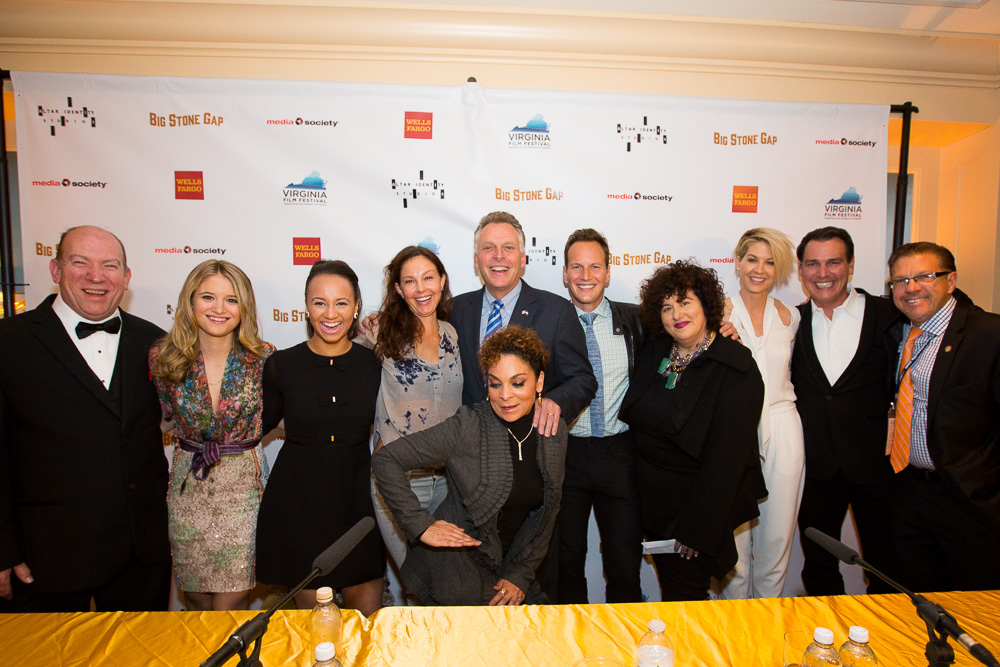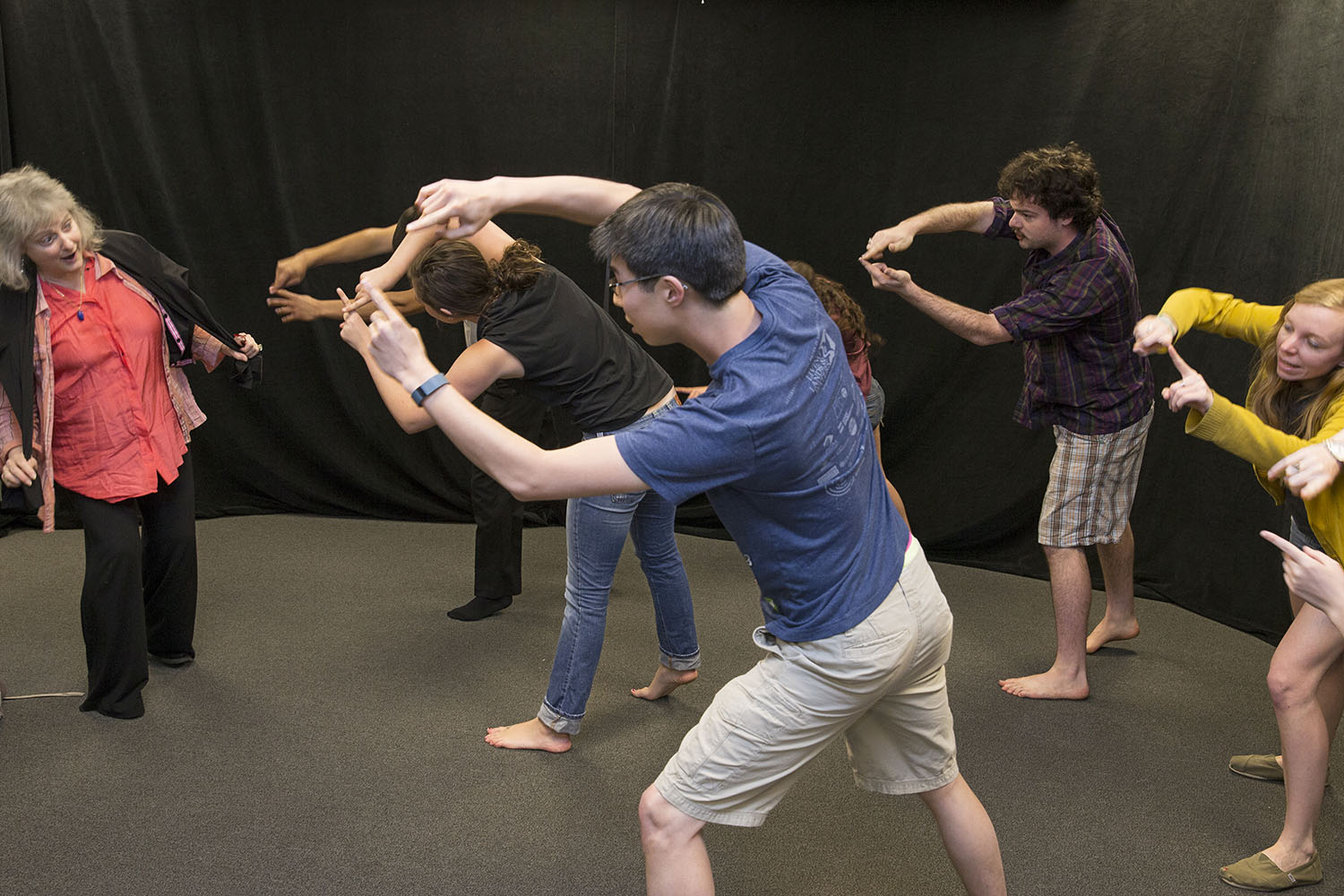Walk by a session of University of Virginia drama professor Kate Burke’s “Voice for Theater” course and you’re likely to hear a cacophony of noises sprinkled with words in a rhythm that sounds like poetry.
Inside a small, unadorned classroom with no windows, about 10 students move around in two lines – necks and shoulders rolling, arms flailing up and down, hips tilting, knees marching and lunging forward. With each different movement, the students utter strange noises, repeat consonant sounds, blow “brrr” and squeal “whoo” until Burke points at the first student.
He continues to go through the series of motions, but now he recites a sonnet by Shakespeare while his peers keep up the noises.
The sound-movement exercise, al ong with several others that occupy the class, are designed to strengthen the students’ voices.
“These exercises are designed to counteract ‘method’ acting,” said Burke, who trained at the Royal Shakespeare Academy. “Method acting” features a group of techniques actors use to focus internally on their feelings and thoughts to identify with and bring out their characters. By contrast, the voice exercises Burke teaches give no time for thinking about feelings. They emphasize “survival.”
“There’s an urgency to get the words out,” she said, instead of trying to express emotions from practice. Once the students master their voices and recitations in challenging situations, they can use it in expressing themselves.
Burke said that focusing on the words of a text – speaking them rather than analyzing them, which entails a removed intellectual process – brings the language alive.

Some Folks
In another voice exercise, class members walk around the room randomly while each recites a different sonnet, previously chosen and memorized. Another particularly challenging drill involves one student reciting the sonnet as several classmates stand close by, heckling the speaker.
After the undergraduates relax and sit on the floor, Burke sits down, and one by one, she asks each student a common college-student question, “So, how’s your relationship going?” and the students have to answer by reciting their sonnets. Following each poetic rendition, they offer each other helpful critiques.
A past president of the Voice and Speech Trainers Association Inc., Burke earned an M.F.A. in acting from Ohio University’s Professional Actor Training Program. She has coached and appeared in many repertory theaters around the U.S. and in other countries.
Fourth-year student Katharine Woff, a double major in drama and French, said Burke has a “great reputation.” She has learned “the voice is integral.”
“I love language and words,” said Woff, who has performed with the student troupe Shakespeare on the Lawn and currently stars in a Live Arts Theater production.
Her classmate, Nayan Karanth, might be a third-year Commerce student, but an interest in singing led him to Burke’s voice class. “This class is a hidden gem,” he said.
In addition to being interested in the spoken word, he said the class has also helped him with giving presentations.
Madeleine Hermsmeier, a second-year major in political philosophy, policy and law, said the class is useful for everyday life and “to be taken more seriously.”
A person’s voice can sound quiet or loud, weak or powerful, according to how the sounds are produced, Burke said. A voice sounds different depending on how the vocal sounds move through the throat, the facial cavities, the nose, the mouth – called “vocal placement.” People can learn how to use their voices more deliberately and confidently, she said.
Burke later recited the opening lines of the Gettysburg Address in a series of distinct voices, demonstrating “vocal placement.”
A speaker’s soft, breathy voice will go unheeded, but no one wants to listen to a loud, strident voice either, she said. Lincoln’s famous speech, delivered in a voice like Julia Child’s or the latest “Valley girl” pitch, can hardly be taken seriously. When Burke exhibits “a normal, full, rich, vibratory, released voice,” the power of the words becomes clear.
Burke also takes her lessons teaching vocal confidence and power on the road, visiting other groups at U.Va., from graduate students teaching for the first time to employees in administrative offices, as well as to church groups and women’s groups.
She recently returned from giving a workshop at “World Theater Day,” an international convention in Rome, Italy. Under the theme, “Performing Gender and Violence in Contemporary National and Transnational Contexts,” several playwrights and scholars from all over the world read and discussed work that explored the possibility of healing through the power of words.
Organized by the Italian national commission of UNESCO, the conference and theme were chosen to mark the passage of tough legislation in Italy devoted to protecting women from domestic violence and to bring attention to the issue.
Burke said the presenters stressed that “healing will only begin when the stories are told” – difficult or traumatic ones about incest, long-time abuse and prison life, for example.
Her workshop on “Voice and Verbal Assertiveness” wrapped up the two-day conference, bringing together about 50 women who spoke six different languages. Burke encouraged everyone to participate, and several of the most enthusiastic participants urged reluctant onlookers to get up and join in as they warmed up their voices by stepping forward and saying their names, with the others repeating their names back to them.
She handed out a poem, “Bread & Roses,” written by James Oppenheimer in 1911 in honor of women, that the group practiced saying line by line in a variety of ways.
“As we come marching, marching, un-numbered women dead/go crying through our singing their ancient song of bread/....yes, bread we fight for –but we fight for roses, too,” the poem goes.
At the workshop’s end, everyone was hugging, and she was pleased they’d reached “a deeper level,” she said. “Silent women were given a voice. The workshop eased the isolated or uncomfortable into a group dynamic where they became full participants.”
“Voicing the text – a physical act – binds people,” Burke said. Songs and chants are common in protests, she said, because they foster solidarity, give people strength and confidence.
Media Contact
Article Information
April 28, 2014
/content/drama-course-brings-alive-power-human-voice

